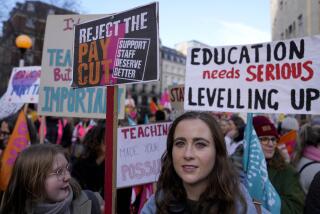New Soviet Strikes Erupt Despite Gorbachev’s Ban
- Share via
MOSCOW — About 50,000 factory and transport workers in Minsk, the capital of the western republic of Byelorussia, defied Soviet President Mikhail S. Gorbachev’s demand for a moratorium on strikes Wednesday and walked off their jobs, protesting low wages and declining living conditions.
In Georgia, President Zviad Gamsakhurdia declared a “state of war” against Moscow and urged Black Sea dockers, railway workers and other state employees to strike in support of the southern republic’s new independence. And in Siberia, the Ukraine and other coal regions, more than 300,000 miners continued their five-week strike, still insisting that Gorbachev and his government resign.
The strike leaders in Byelorussia said they will continue their job actions until Moscow convenes negotiations. Some Soviet commentators were surprised that Minsk’s normally quiet workers staged such a dramatic strike.
However, historian Roy Medvedev, a Supreme Soviet deputy, said: “In some parts of the country, in the big cities, in the south, there is a huge black market economy and almost everyone takes part in it. But in Byelorussia, the black market economy is very weak and so everyone there was hit very badly by the April 2 price rises. Suddenly their salaries were worth half of what they were.”
Threatened by a collapsing economy, rebellion in the republics and his lack of popular support, Gorbachev presented an “anti-crisis” package Tuesday as a kind of authoritarian road to eventual reform. He plans to develop a market economy but at the same time said he will resort to all the instruments of traditional Soviet power to crack down on republics that refuse to maintain economic and political links with the union.
Gorbachev adviser Georgy Shakhnazarov said that “if we cannot establish some order in this country, then everything will be possible--even hunger.” He emphasized that Gorbachev is prepared to participate in round-table meetings with various political forces, including Russian Federation leader Boris N. Yeltsin.
More to Read
Sign up for Essential California
The most important California stories and recommendations in your inbox every morning.
You may occasionally receive promotional content from the Los Angeles Times.










